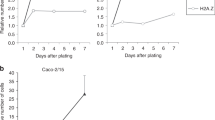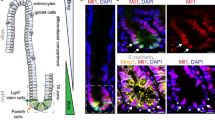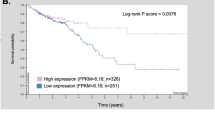Abstract
The gut-specific homeotic transcription factor Cdx2 is a crucial regulator of intestinal development and homeostasis, which is downregulated in colorectal cancers (CRC) and exhibits a tumor suppressor function in the colon. We have previously established that several endodermal transcription factors, including HNF4α and GATA6, are involved in Cdx2 regulation in the normal gut. Here we have studied the role of HNF4α in the mechanism of deregulation of Cdx2 in colon cancers. Crossing ApcΔ14/+ mice prone to spontaneous intestinal tumor development with pCdx2-9LacZ transgenic mice containing the LacZ reporter under the control of the 9.3-kb Cdx2 promoter showed that this promoter segment contains sequences recapitulating the decrease of Cdx2 expression in intestinal cancers. Immunohistochemistry revealed that HNF4α, unlike GATA6, exhibited a similar decrease to Cdx2 in genetic (Apcmin/+ and ApcΔ14/+) and chemically induced (Azoxymethane (AOM) treatment) models of intestinal tumors in mice. HNF4α and Cdx2 also exhibited a comparable deregulated pattern in human CRC. Correlated patterns were observed between HNF4α and Cdx2 in several experimental models of human colon cancer cell lines: xenografts in nude mice, wound healing and glucose starvation. Furthermore, Cdx2 decreased by knocking down HNF4α in human colon cancer cells using siRNA and in the colon of mice conditionally knocked out for the Hnf4α gene in the adult intestine (Hnf4αf/f;VilCreERT2 mice). Finally, the conditionally knocked out mice Hnf4αf/f;VilCreERT2 treated with the carcinogen AOM developed colorectal tumors earlier than wild-type mice, as previously reported for mice with a reduced Cdx2 expression. In conclusion, this study provides evidence that the downregulation of HNF4α is an important determinant of the reduced expression of the Cdx2 tumor suppressor gene in intestinal cancers. Consistently, similar to Cdx2, HNF4α exerts a tumor suppressor function in the colon in that its loss of function facilitates tumor progression.
This is a preview of subscription content, access via your institution
Access options
Subscribe to this journal
Receive 50 print issues and online access
$259.00 per year
only $5.18 per issue
Buy this article
- Purchase on Springer Link
- Instant access to full article PDF
Prices may be subject to local taxes which are calculated during checkout




Similar content being viewed by others
References
Beck F, Chawengsaksophak K, Waring P, Playford RJ, Furness JB . Reprogramming of intestinal differentiation and intercalary regeneration in cdx2 mutant mice. Proc Natl Acad Sci USA 1999; 96: 7318–7323.
Verzi MP, Shin H, He HH, Sulahian R, Meyer CA, Montgomery RK et al. Differentiation-specific histone modifications reveal dynamic chromatin interactions and partners for the intestinal transcription factor CDX2. Dev Cell 2010; 19: 713–726.
Stringer EJ, Duluc I, Saandi T, Davidson I, Bialecka M, Sato T et al. Cdx2 determines the fate of postnatal endoderm. Development 2012; 139: 465–474.
Hinoi T, Tani M, Lucas PC, Caca K, Dunn RL, Macri E et al. Loss of CDX2 expression and microsatellite instability are prominent features of large cell minimally differentiated carcinomas of the colon. Am J Pathol 2001; 159: 2239–2248.
Brabletz T, Spaderna S, Kolb J, Hlubek F, Faller G, Bruns CJ et al. Down-regulation of the homeodomain factor Cdx2 in colorectal cancer by collagen type I: an active role for the tumor environment in malignant tumor progression. Cancer Res 2004; 64: 6973–6977.
Subtil C, Guerin E, Schneider A, Chenard MP, Martin E, Domon-Dell C et al. Frequent rearrangements and amplification of the CDX2 homeobox gene in human sporadic colorectal cancers with chromosomal instability. Cancer Lett 2007; 247: 197–203.
Bonhomme C, Duluc I, Martin E, Chawengsaksophak K, Chenard MP, Kedinger M et al. The Cdx2 homeobox gene has a tumour suppressor function in the distal colon in addition to a homeotic role during gut development. Gut 2003; 52: 1465–1472.
Aoki K, Tamai Y, Horiike S, Oshima M, Taketo MM . Colonic polyposis caused by mTOR-mediated chromosomal instability in Apc(+/Delta716) Cdx2(+/−) compound mutant mice. Nat Genet 2003; 35: 323–330.
Gross I, Duluc I, Benameur T, Calon A, Martin E, Brabletz T et al. The intestine-specific homeobox gene Cdx2 decreases mobility and antagonizes dissemination of colon cancer cells. Oncogene 2008; 27: 107–115.
Da Costa LT, He TC, Yu J, Sparks AB, Morin PJ, Polyak K et al. CDX2 is mutated in a colorectal cancer with normal APC/beta-catenin signaling. Oncogene 1999; 18: 5010–5014.
Lorentz O, Cadoret A, Duluc I, Capeau J, Gespach C, Cherqui G et al. Downregulation of the colon tumour-suppressor homeobox gene Cdx-2 by oncogenic ras. Oncogene 1999; 18: 87–92.
Kim S, Domon-Dell C, Wang Q, Chung DH, Di Cristofano A, Pandolfi PP et al. PTEN and TNF-α regulation of the intestinal-specific Cdx-2 homeobox gene through a PI3K, PKB/Akt, and NF-kappaB-dependent pathway. Gastroenterology 2002; 123: 1163–1178.
Benahmed F, Gross I, Gaunt SJ, Beck F, Jehan F, Domon-Dell C et al. Multiple regulatory regions control the complex expression pattern of the mouse Cdx2 homeobox gene. Gastroenterology 2008; 135: 1238–1247.
Sladek FM, Zhong WM, Lai E, Darnell JE . Liver-enriched transcription factor HNF-4 is a novel member of the steroid hormone receptor superfamily. Genes Dev 1990; 4: 2353–2365.
Drewes T, Senkel S, Holewa B, Ryffel GU . Human hepatocyte nuclear factor 4 isoforms are encoded by distinct and differentially expressed genes. Mol Cell Biol 1996; 16: 925–931.
Taraviras S, Monaghan AP, Schutz G, Kelsey G . Characterization of the mouse HNF-4 gene and its expression during mouse embryogenesis. Mech Dev 1994; 48: 67–79.
Parviz F, Matullo C, Garrison WD, Savatski L, Adamson JW, Ning G et al. Hepatocyte nuclear factor 4alpha controls the development of a hepatic epithelium and liver morphogenesis. Nat Genet 2003; 34: 292–296.
Archer A, Sauvaget D, Chauffeton V, Bouchet PE, Chambaz J, Pincon-Raymond M et al. Intestinal apolipoprotein A-IV gene transcription is controlled by two hormone-responsive elements: a role for hepatic nuclear factor-4 isoforms. Mol Endocrinol 2005; 19: 2320–2334.
Carriere V, Vidal R, Lazou K, Lacasa M, Delers F, Ribeiro A et al. HNF-4-dependent induction of apolipoprotein A-IV gene transcription by an apical supply of lipid micelles in intestinal cells. J Biol Chem 2005; 280: 5406–5413.
Garrison WD, Battle MA, Yang C, Kaestner KH, Sladek FM, Duncan SA . Hepatocyte nuclear factor 4alpha is essential for embryonic development of the mouse colon. Gastroenterology 2006; 130: 1207–1220.
Cattin AL, Le Beyec J, Barreau F, Saint-Just S, Houllier A, Gonzalez FJ et al. Hepatocyte nuclear factor 4alpha, a key factor for homeostasis, cell architecture, and barrier function of the adult intestinal epithelium. Mol Cell Biol 2009; 29: 6294–6308.
Ahn SH, Shah YM, Inoue J, Morimura K, Kim I, Yim S et al. Hepatocyte nuclear factor 4alpha in the intestinal epithelial cells protects against inflammatory bowel disease. Inflamm Bowel Dis 2008; 14: 908–920.
Boyd M, Bressendorff S, Moller J, Olsen J, Troelsen JT . Mapping of HNF4alpha target genes in intestinal epithelial cells. BMC Gastroenterol 2009; 9: 68–84.
Bonhomme C, Calon A, Martin E, Robine S, Neuville A, Kedinger M et al. Cdx1, a dispensable homeobox gene for gut development with limited effect in intestinal cancer. Oncogene 2008; 32: 4497–4502.
Colnot S, Niwa-Kawakita M, Hamard G, Godard C, Le Plenier S, Houbron C et al. Colorectal cancers in a new mouse model of familial adenomatous polyposis: influence of genetic and environmental modifiers. Lab Invest 2004; 84: 1619–1630.
Tanaka T, Kohno H, Suzuki R, Hata K, Sugie S, Niho N et al. Dextran sodium sulfate strongly promotes colorectal carcinogenesis in Apc(Min/+) mice: inflammatory stimuli by dextran sodium sulfate results in development of multiple colonic neoplasms. Int J Cancer 2006; 118: 25–34.
Su LK, Kinzler KW, Vogelstein B, Preisinger AC, Moser AR, Luongo C et al. Multiple intestinal neoplasia caused by a mutation in the murine homolog of the APC gene. Science 1992; 256: 668–670.
Neuville A, Nicolet C, Meyer N, Schneider A, Legrain M, Brigand C et al. Histologic characteristics of non–microsatellite-instable colon adenomas correlate with distinct molecular patterns. Hum Pathol 2011; 42: 244–253.
Tanaka T, Jiang S, Hotta H, Takano K, Iwanari H, Sumi K et al. Dysregulated expression of P1 and P2 promoter-driven hepatocyte nuclear factor-4alpha in the pathogenesis of human cancer. J Pathol 2006; 208: 662–672.
Benahmed F, Gross I, Guenot D, Jehan F, Martin E, Domon-Dell C et al. The microenvironment controls CDX2 homeobox gene expression in colorectal cancer cells. Am J Pathol 2007; 170: 733–744.
Li T, Chanda D, Zhang Y, Choi HS, Chiang JY . Glucose stimulates cholesterol 7alpha-hydroxylase gene transcription in human hepatocytes. J Lipid Res 2010; 51: 832–842.
Hayhurst GP, Lee YH, Lambert G, Ward JM, Gonzalez FJ . Hepatocyte nuclear factor 4 (nuclear receptor 2A1) is essential for maintenance of hepatic gene expression and lipid homeostasis. Mol Cell Biol 2001; 21: 1393–1403.
El Marjou F, Janssen KP, Chang BH, Li M, Hindie V, Chan L et al. Tissue-specific and inducible Cre-mediated recombination in the gut epithelium. Genesis 2004; 39: 186–193.
Darsigny M, Babeu JP, Seidman EG, Gendron FP, Levy E, Carrier J et al. Hepatocyte nuclear factor-4alpha promotes gut neoplasia in mice and protects against the production of reactive oxygen species. Cancer Res 2010; 70: 9423–9433.
Lazarevich NL, Shavochkina DA, Fleishman DI, Kustova IF, Morozova OV, Chuchuev ES et al. Deregulation of hepatocyte nuclear factor 4 (HNF4) as a marker of epithelial tumors progression. Exp Oncol 2010; 32: 167–171.
Calon A, Gross I, Lhermitte B, Martin E, Beck F, Duclos B et al. Different effects of the Cdx1 and Cdx2 homeobox genes in a murine model of intestinal inflammation. Gut 2007; 56: 1688–1695.
Acknowledgements
This work was supported by Inserm, Ligue contre le Cancer du Haut-Rhin and the Cancéropôle Grand-Est (France). TS was funded by the Association for International Cancer Research (AICR, UK) and by the Département de Mayotte (France), and Fl B by the Cancéropôle Ile-de-France.
Author information
Authors and Affiliations
Corresponding author
Ethics declarations
Competing interests
The authors declare no conflict of interest.
Rights and permissions
About this article
Cite this article
Saandi, T., Baraille, F., Derbal-Wolfrom, L. et al. Regulation of the tumor suppressor homeogene Cdx2 by HNF4α in intestinal cancer. Oncogene 32, 3782–3788 (2013). https://doi.org/10.1038/onc.2012.401
Received:
Revised:
Accepted:
Published:
Issue Date:
DOI: https://doi.org/10.1038/onc.2012.401
Keywords
This article is cited by
-
Delineating the role of nuclear receptors in colorectal cancer, a focused review
Discover Oncology (2024)
-
MicroRNA-766-3p-mediated downregulation of HNF4G inhibits proliferation in colorectal cancer cells through the PI3K/AKT pathway
Cancer Gene Therapy (2022)
-
MUC6 distribution in the spectrum of pulmonary mucinous adenocarcinoma
Modern Pathology (2022)
-
TGR5-HNF4α axis contributes to bile acid-induced gastric intestinal metaplasia markers expression
Cell Death Discovery (2020)
-
Role of hepatocyte nuclear factor 4 alpha in cell proliferation and gemcitabine resistance in pancreatic adenocarcinoma
Cancer Cell International (2019)



